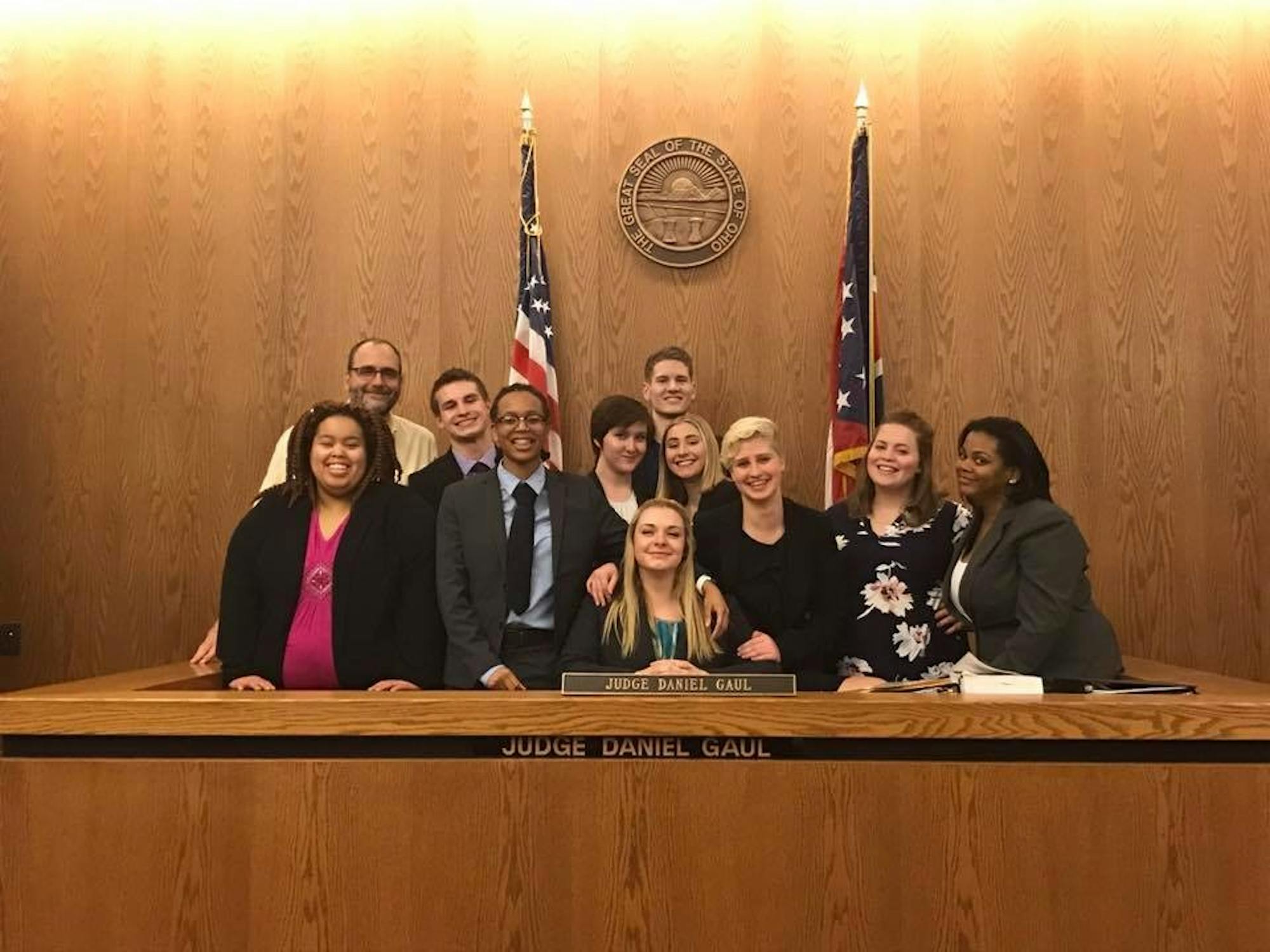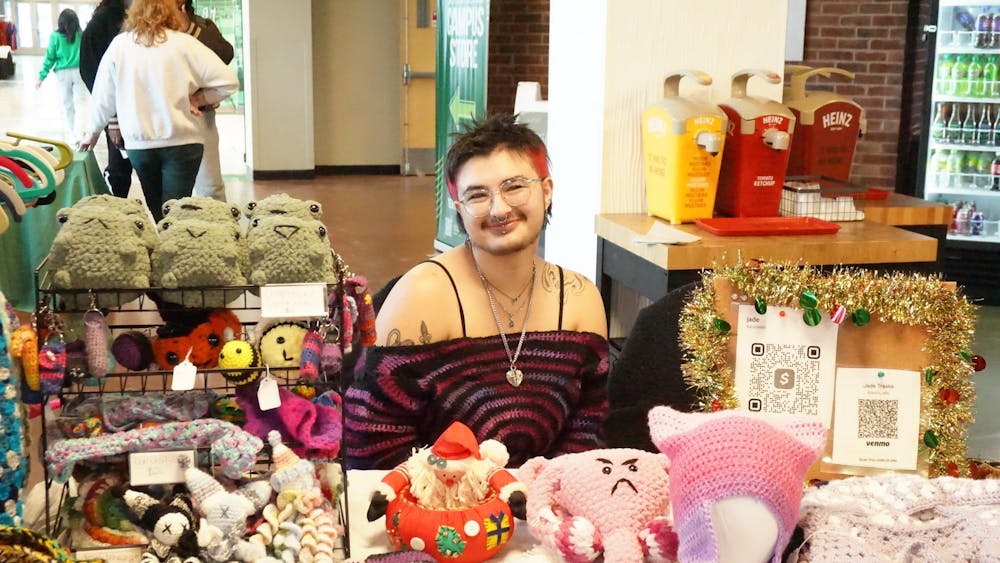Since 2002, Eastern Michigan University has participated in American Mock Trial Association competitions. This year is no exception, as the 2016-2017 team just returned from the AMTA’s regional competition Feb. 25 in Cleveland, Ohio -- the results of the regional competition have not been released.
Mock Trial doesn’t have a course that accompanies it – instead it’s an extracurricular activity funded by EMU. Along with alumni from the team, Pyle leads team members by teaching the fundamentals of evidence law. Students are given a case that they prepare to present in a courtroom setting, where their ability to think on their feet and form a convincing argument is tested.
Teams of six to 10 students play the roles of attorneys, plaintiffs and even witnesses in a single case presented by the AMTA. Competitions are split into rounds, starting with an opening statement, followed by three witness testimonies from each side. A direct examination and a cross-examination of each witness is done and scored. Afterward each school gives a closing argument.
Actual judges from the area or working attorneys play the role of judges, while the ‘jury’ is normally a single scorekeeper tracking points for each school. Once the round begins, students have complete control over how the proceedings go.
“They have complete responsibility with what goes on in the round,” Pyle said. “In fact, if they do talk to me and ask me what to do, they can be penalized and removed from the tournament.”
Tournaments work in a very similar fashion to most sports teams, as well as having A and B teams that work like varsity and junior varsity in sports. One case file is provided by the AMTA that is used for all competitions, including regionals and invitational tournaments. The only time this case changes is if teams manage to get to nationals – which is split into two opening rounds before leading to the final competition – where a brand-new case is presented.
Nationals tend to be dominated by major law school undergraduate teams.
“It’s difficult to break into the top 40 – you’re talking about Harvard, UCLA, Stanford, Georgetown and schools like that,” Pyle said.
While it’s reasonable to believe mock trial is meant solely for political science or constitutional law students, Pyle insists that isn’t the case in the slightest.
“One thing people don’t know about the mock trial team is that this year almost half the team aren’t political science students,” he said. “We have students from the College of Business, health administration, the College of Technology – students from all across campus.”
He also encourages anyone who enjoys acting or is in theatre to join to play as witnesses.
Pyle teaches all students who join the team about the rules of evidence and courtroom procedure, allowing anyone who’s interested to join. Maya Rich, alumnae of EMU and now a law student at the University of Virginia, wasn’t even planning on becoming a lawyer until she joined mock trial.
“I was originally planning on majoring in theatre,” she said. “I was really involved with it until I switched to political science and joined mock trial.”
Rich joined as a sophomore, working as a closing attorney and opening for prosecution on the A team. For her, mock trial was an invaluable resource for learning the demeanor and skills required in a courtroom setting.
“You learn to analyze a fact pattern that’s legally sound but also appealing to a jury,” she said. “I’m still using those skills from mock trial – if you’re thinking about going to law school, nothing is better as a resource.”
Evidence law and courtroom etiquette isn’t the only skills students learn from the team. According to Sarah Reasoner, a junior at EMU and vice president of the executive board for the current team, her self-confidence greatly improved with her participation.
“You learn the confidence to get up and play your role and not get caught up in the little details,” she said. “A lot of it has to do with understanding that nothing you do is perfect and it’s about improving and learning along the way.”
Reasoner spoke highly of the friendships she’s made on the team, as well as the sense of community with the ranks. She said despite highly intimidating opposition from other schools, she saw confidence in even the least experienced members of the team.
“No one acted like they didn’t belong there.” She said, in reference to the recent regionals tournament.
Pyle encourages anyone to join that wants to improve on valuable skills; regardless of the major they’re in.
“It teaches you critical thinking skills, it forces them to think on their feet and adapt to various situations, most importantly extemporaneous speaking,” he said. “You can prepare for the trial but you can’t predict what’s going to happen.”
Rich said confidence in public speaking was one of the best skills she learned.
“Mock trial will force you to do things you’re uncomfortable with in terms of getting up and speaking,” she said. “It’s about thinking critically and on your feet.”
Mock trial meets in two rooms, 401 and 402 this year, in King Hall on Mondays and Thursdays from 7 p.m. to 10 p.m. While this year’s season is coming to a close with the school year, Pyle always encourages new members to join up – if they’re willing to take on the responsibility.
“People should expect to work three to four hours a week on mock trial just prepping and preparing,” he said. “It’s a commitment, but its rewards speak for itself.”
The mock trial team hopes to increase their advertising in order to pull more people to join in the future through fliers and word-of-mouth, as well as showing up to freshman and transfer student events in the coming year.
Dr. Pyle has office hours from 8:30 a.m. to 9:30 a.m. and 11 a.m. to 12:30 a.m. on Tuesdays and Thursdays in room 601D Pray Harrold.










